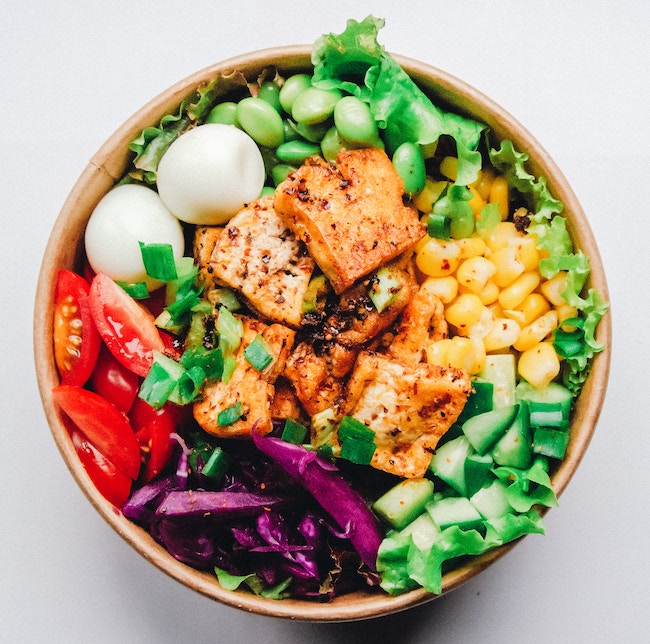This is a sponsored post with North Carolina Egg Association, in partnership with the NC Department of Agriculture & Consumer Services and the NC Tobacco Trust Fund. You can find delicious recipes and more information on egg nutrition here. All opinions expressed in this post are my own.
Eggs are one of my favorite go-to foods. I find they are also one of the most misunderstood foods. Many of my clients know eggs are a good source of protein, but they tend to be confused about other nutrients in eggs or whether they should eat them at all. The truth? Studies show that eggs may offer unparalleled health benefits.
So, let’s clear up the confusion. Here are some of the egg questions that I hear most often and why eggs may just be one of the most understated foods.

Egg Nutrition & Health Benefits
Q: I know eggs are high in protein, but do they provide any other nutrients?
A: Yes! In addition to the 6 grams of high-quality protein, one large egg provides more than 8 essential nutrients, including choline, iron, vitamins D and A, B vitamins and the antioxidants lutein and zeaxanthin—all in a 70-calorie package. Actually, eggs are one of the few foods that naturally contain vitamin D, which is critical for healthy bones and a healthy immune system.
Q: Should I avoid egg yolks if I am concerned about high cholesterol?
A: No, you do not need to avoid egg yolks. In fact, most of the nutrients mentioned above and nearly half of the protein are found in the yolk. While egg yolks do contain cholesterol (as do all animal products), the science is clear that dietary cholesterol—that is, cholesterol we get from food—doesn’t impact blood cholesterol levels for most people. In 2015, Dietary Guidelines for Americans removed dietary cholesterol as a nutrient of concern and all limits around it.
The Dietary Guidelines for Americans, the American Heart Association and other organizations recommend eating eggs as part of a heart-healthy diet. Interestingly, a study published in the journal Heart found that a moderate intake of eggs (up to <1 egg per day) was significantly associated with a lower risk of heart disease. And because the yolk contains beneficial fats, eating the whole egg—as part of a heart-healthy diet—may help improve cholesterol levels by increasing HDL (“good”) cholesterol and decreasing blood pressure without changing LDL (“bad”) cholesterol levels.

Q: What other health benefits do eggs provide?
A: Eggs provide numerous other health benefits—particularly for the brain, eyes and muscles, as well as metabolic health—across all life stages.
We may not think of eggs as brain food, but we should. Thanks to the choline and carotenoids lutein and zeaxanthin, eggs provide nutrients that are important for brain health throughout our whole life span. Getting enough choline during pregnancy and a baby’s early years is critical to optimal brain development. And, lutein has been favorably associated with academic performance in children and cognitive function in older adults.
Don’t forget eye health. We’ve long known that carotenoids are good for the eyes. But it turns out those carotenoids in the yolk—lutein and zeaxanthin—may also help protect against blue light, which is more important now than ever since we spend so much time staring at screens. Plus, lutein may help reduce the risk of cataracts and slow age-related macular degeneration.
And since eggs are a complete protein that contain all 9 essential amino acids, eating eggs help refuel muscles and optimize recovery after workouts, help you feel fuller longer (which may help curb snacking on less nutritious foods later in the day) and keep blood sugar levels stable.

Plant-Based Diets & Sustainability
Q: I’ve heard about the benefits of plant-forward eating. How do eggs fit into a more plant-based diet?
A: Plant-based diets have been getting more attention recently, and for good reason since they focus on eating more vegetables. The good news is that eggs are a perfect protein to pair with vegetables! Salads, grain bowls, roasted veggies, you name it… they all taste better when topped with an egg. Another perk: Eating a whole egg with nutrient-rich foods helps increase the absorption of fat-soluble vitamins found in many vegetables, such as vitamins E, A and K.

Q: Are eggs good for the environment?
A: Eggs are considered a sustainable protein. Even with the increase of egg production in the U.S., total environmental footprint has decreased, thanks to responsible egg farming practices and the sparing of natural resources. In fact, studies show that egg farms today use fewer natural resources—about one-third less water and half the amount of feed—compared to egg farming in the 1960s. Egg farmers work hard to take good care of their community, hens and land and have achieved a 71 percent reduction in greenhouse gas emissions. For more on sustainability of NC egg farms, check out this NC Egg video.
Buying & Cooking Eggs
Q: Protein foods seem so expensive. How can I get enough protein without breaking the bank?
A: Yes, food prices keep going up. Fortunately, eggs are one of the more affordable sources of high-quality protein. Right now, the price of one egg costs around 15 cents. Considering all of the protein, vitamins, minerals and antioxidants in one large egg, that’s one of the best protein bargains at the grocery store!
Q: Besides scrambled eggs for breakfast, how else can I cook with eggs?
A: Eggs are incredibly versatile and convenient! And they’re not just for breakfast! Enjoy eggs throughout the day, at lunch and dinner and as snacks. Hard-boil a batch at the beginning of the week for an easy grab-and-go post-workout fuel. Bake up some egg and veggie muffins for an easy-to-grab snack or pair with berries for your kid’s lunch. Add to rice or ramen bowls. Serve chopped or grated in salads. Cook in a rich tomato sauce for a deliciously savory shakshuka dinner. The possibilities are endless.
Here are some of my favorite recipes from the North Carolina Egg Association:
- Microwave Egg & Veggie Breakfast Bowl – Check out my step-by-step on IG for these grab-and-go protein bowls
- Butternut Squash & Spinach Quiche – Great to make ahead for any meal
- Caprese Egg Muffins – Perfect grab-and-go breakfast or snack
- Spicy Sriracha Baked Avocado Eggs – Check out my step-by-step instructions on IG
- Moroccan Shakshuka with Lentils – Perfect for a healthy comfort foods
- Noodle Zoodle Egg Bowl – Easy weeknight dinner step-by-step instructions on IG
Bottom Line
No matter which way you crack it, eggs are a nutritious protein-rich food that provide numerous health benefits over the entire lifespan. Plus, eggs pair perfectly with other nutrient-rich foods—like vegetables, avocados, herbs and whole grains—and fit in a variety of eating patterns, from plant-forward and Mediterranean to keto and DASH diets.
Thank you too North Carolina Egg Association for sponsoring this post. For more delicious egg recipes and egg nutrition, visit NCEgg.org.







0 Comments